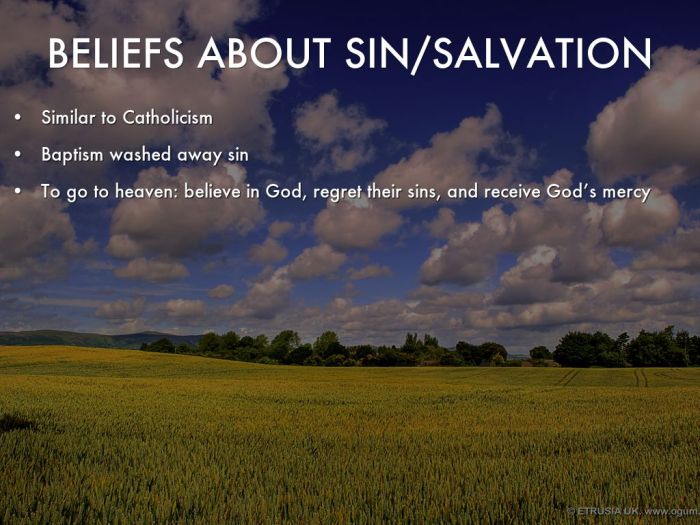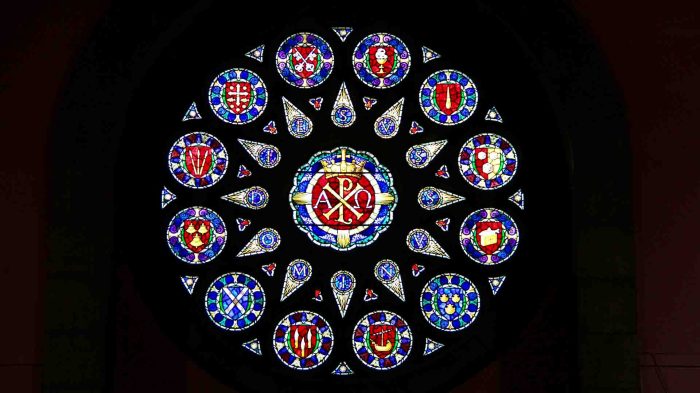Anglicanism beliefs about sin and salvation – Anglican beliefs about sin and salvation form a distinctive and nuanced theological framework that has shaped the Anglican tradition for centuries. This guide delves into the core tenets of Anglican soteriology, exploring the nature of sin, the consequences of transgression, the role of Christ in redemption, and the means and assurance of salvation.
The Anglican understanding of sin acknowledges both the inherent fallenness of humanity and the significance of personal choices. Original sin is recognized as a condition that predisposes individuals to sin, but free will remains a crucial factor in determining individual responsibility.
The Nature of Sin
Anglicans believe that sin is a rebellion against God’s will and a violation of his commandments. Sin is not merely an act, but a state of being that results from the fall of humanity from its original state of grace.
The Anglican understanding of sin includes both original sin, which is inherited from Adam and Eve, and actual sin, which is committed by individuals.
Original Sin, Anglicanism beliefs about sin and salvation
Original sin is the state of sin that all humans are born into as a result of the fall of Adam and Eve. This sin is not a personal choice, but a consequence of the rebellion of our first parents.
Original sin is passed down from generation to generation through the act of procreation.
Actual Sin
Actual sin is a specific act of disobedience to God’s will. Actual sins can be either venial or mortal. Venial sins are less serious offenses that do not result in the loss of salvation. Mortal sins are serious offenses that result in the loss of salvation unless they are repented of.
Free Will
Anglicans believe that humans have free will, which means that they are capable of choosing between good and evil. This free will is not absolute, however, as it is limited by the effects of original sin. Nevertheless, humans are responsible for their actions and will be judged accordingly.
The Consequences of Sin
Anglicans believe that sin has serious consequences, both in this life and in the next. The immediate consequence of sin is the loss of communion with God. Sin also leads to physical and emotional suffering, as well as social and economic problems.
Eternal Punishment
The ultimate consequence of sin is eternal punishment in hell. Hell is a place of torment and suffering where those who die in a state of mortal sin will be punished for all eternity. The Anglican Church teaches that eternal punishment is a real and terrible possibility, but it is not inevitable.
Those who repent of their sins and receive God’s forgiveness can avoid eternal punishment.
Repentance and Forgiveness
Anglicans believe that repentance and forgiveness are essential for salvation. Repentance is the act of turning away from sin and towards God. Forgiveness is the act of God by which he pardons our sins and restores us to communion with him.
The Role of Christ in Salvation: Anglicanism Beliefs About Sin And Salvation

Jesus Christ is the central figure in Anglican soteriology. Anglicans believe that Christ died on the cross to atone for our sins and to reconcile us to God. Christ’s resurrection from the dead is the ultimate victory over sin and death.
Christ’s Death and Resurrection
Christ’s death on the cross was a sacrifice for our sins. By dying on the cross, Christ took upon himself the punishment that we deserved for our sins. Christ’s resurrection from the dead is the proof of his victory over sin and death.
It is also the guarantee of our own resurrection and eternal life.
Grace
Grace is the unmerited favor of God. It is through grace that we are saved from sin and reconciled to God. Grace is not something that we can earn or deserve. It is a gift from God that we receive through faith in Jesus Christ.
The Means of Salvation

Anglicans believe that salvation is a gift from God that we receive through faith in Jesus Christ. Salvation is not something that we can earn or deserve. It is a gift that we receive through the grace of God.
Faith, Repentance, and Baptism
The first step to salvation is faith in Jesus Christ. Faith is the belief that Jesus Christ is the Son of God and that he died on the cross to atone for our sins. Repentance is the act of turning away from sin and towards God.
Baptism is the sacrament by which we are initiated into the Christian faith.
The Sacraments
The sacraments are outward and visible signs of inward and spiritual grace. The sacraments are not necessary for salvation, but they are a means by which God’s grace is given to us.
The Assurance of Salvation

Anglicans believe that we can have assurance of our salvation through the Holy Spirit. The Holy Spirit is the third person of the Trinity who indwells all Christians. The Holy Spirit gives us the assurance that we are saved and that we will inherit eternal life.
The Role of the Holy Spirit
The Holy Spirit is the one who convicts us of our sins and leads us to repentance. The Holy Spirit is also the one who gives us the assurance that we are saved. The Holy Spirit is the guarantee of our inheritance in heaven.
Perseverance in Faith
The assurance of salvation is not a guarantee that we will never sin again. However, it is a guarantee that we will persevere in faith until the end. The assurance of salvation is a gift from God that we should cherish and hold onto.
Detailed FAQs
What is the Anglican view on the nature of sin?
Anglicans believe that sin is both a condition of inherent fallenness and a result of personal choices. Original sin predisposes individuals to sin, but free will remains a crucial factor in determining individual responsibility.
What are the consequences of sin according to Anglicanism?
Anglicans believe that sin has both temporal and eternal consequences. Temporal consequences include suffering, alienation, and broken relationships. Eternal consequences include separation from God and eternal punishment.
What is the role of Christ in Anglican soteriology?
Christ is central to Anglican soteriology. His death and resurrection are seen as the means by which God reconciles humanity to himself. Through faith in Christ, individuals can receive forgiveness of sins and eternal life.
How do Anglicans understand the means of salvation?
Anglicans believe that salvation is a gift of God’s grace, received through faith in Christ. Faith is accompanied by repentance, baptism, and participation in the sacraments. These means of grace are seen as channels through which God’s saving work is mediated.
What is the Anglican perspective on the assurance of salvation?
Anglicans believe that assurance of salvation is a gift of the Holy Spirit. It is based on faith in Christ, repentance, and a life lived in accordance with God’s will. However, Anglicans also recognize that assurance is not always a constant experience, and that doubts and fears can arise.